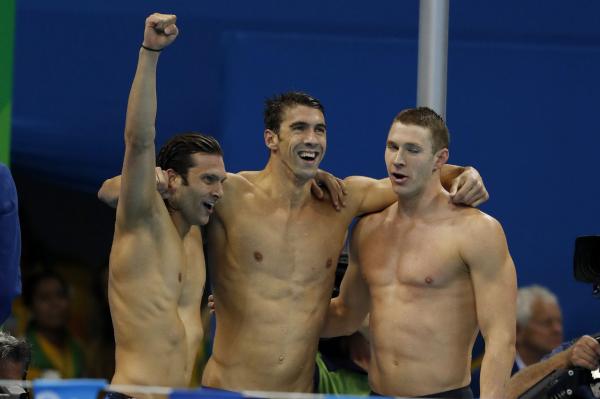
No athlete from Singapore had ever won a gold medal before Joseph Schooling beat Michael Phelps Friday in the 100-meter butterfly.
Phelps and fellow American swimmer Katie Ledecky cashed in $200,000 for winning eight gold medals. The duo also combined for $30,000 for its two silver medals.
Schooling scored $753,000 by beating Phelps in one swim.
Kazakhstan’s Nijat Rahimov and Dmitriy Bradley will take home a combined $460,000 from two gold medals.
According to Yahoo Sports, Singapore leads all countries in money awarded for gold medal winners.
Singapore gives $753,000 per gold medal to its athletes. Indonesia gives athletes $383,000 for each top prize. Azerbaijan gives athletes $255,000 for a gold medal. Kazakhstan’s gold medal winners receive $230,000. Italy gives athletes $185,000, France gives $66,000, Russia gives $61,000, and South Africa gives its stars $36,000 for each gold medal.
The United States ranks No. 9 on that list.
Full Story
Rio Games spokesman explains chemical mixup caused green pool water
RIO DE JANEIRO, Aug. 13 (UPI) — A spokesman for the Rio Games said the green pool water that has mystified organizers and sparked complaints from athletes of burning eyes, poor visibility and foul odors was caused by the mistaken addition of hydrogen peroxide as the Olympics got under way.
Rio Games spokesman Mario Andrada said an unidentified contractor added 160 liters of hydrogen peroxide, a common pool cleanser, on Aug. 5. When used in tandem with chlorine, hydrogen peroxide renders the former chemical ineffective, allowing algae to grow in the diving pool and a secondary pool used for water polo and synchronized swimming.
The main pool for men’s and women’s swimming has been unaffected and the water is clear.
Andrada said maintenance staff will drain the synchro pool because teams require the ability to see clearly underwater while competing. That process was expected to take about 10 hours and water from a practice pool will be used to replace the green, murky water.
Synchronized swimming is scheduled to begin on Sunday. Organizers did not say whether the start of the competition will need to be delayed.
Full story
Team USA’s Paul George says team needs to “man up”
RIO DE JANEIRO, Aug. 13 (UPI) — Close calls aren’t commonplace for the United States basketball program.
So winning its last two games by a combined 13 points could be deemed unacceptable, even at an Olympic level.
After the United States men beat Serbia 94-91 Friday, Indianapolis Pacers star Paul George said the team needs to get defensive.
“Defensively, is where we have to man up,” George said, according to TIME.
Despite legendary college basketball coach Mike Krzyzewski and a cast of All-World talent, Team USA has not been blowing teams out per usual.
“When we’re playing, we think it’s a huge game,” Krzyzewski told USA TODAY. “When our opponents play, it’s a huge game and we’re going to get their best shot, and it’s kind of free money. [They] play a game like this and [they’re] going to be celebrated win or lose. For us, that’s not the case – ever. We just have to understand that.”
Friday’s victory was Team USA’s 21st consecutive Olympic win and 49th straight international victory.
Full Story
Former USWNT teammates call Hope Solo comments “classless”
BRASILIA, Brazil, Aug. 13 (UPI) — Hope Solo might not be solo in the way she felt after the United States lost its quarterfinal matchup Friday to Sweden, but she is the only one who offered a harsh sound bite.
Now its biting back.
After the match, Solo told Sports Illustrated’s Grant Wahl that she thought Sweden was “cowards.”
“I thought that we played a courageous game. I thought we had many opportunities on goal. I think we showed a lot of heart,” Solo told Wahl. “We came back from a goal down. I’m very proud of this team.”
“And I also think we played a bunch of cowards. The better team did not win today. I strongly believe that. I think you saw American heart. You saw us give everything we had today.”
The USWNT lost the match in penalty kicks after a 1-1 draw in regulation at the Summer Games. It will be the first major tournament the USWNT has played without making the semifinal.
Former USWNT teammate and ESPN analyst, Julie Foudy responded to Solo’s slight.
“I shook my head,” Foudy said on ESPN. “I thought, why is that necessary. There’s a long history and tradition with our national team of respecting others when you lose, so I don’t agree with it at all. I think it’s pretty obvious that Sweden took a tactic that most outmatched teams take in soccer, it’s been happening for centuries in fact.”
“They played a lower defensive line, I wouldn’t even call it a bunker because they did come out, it wasn’t like they bunkered the entire game. To call them cowards for playing a tactically smart game is ridiculous and classless, and it really doesn’t represent the house that we built with the U.S. team.”
Full Story
Competition heating up for fans, players at Rio games — for different kind of medals
RIO DE JANEIRO, Aug. 12 (UPI) — The competition in Rio de Janeiro is fierce, sometimes mentally taxing, and often the winners are determined by who has the best timing.
But these games aren’t athletic — they’re aesthetic. It’s pin trading.
As the world’s greatest athletes settle victories on the field, in the arenas and in the water, attendees of the Games of the XXXI Summer Olympiad are going after their own medals in the form of small, tin souvenirs of the games.
Many are often surprised to learn just how popular pin trading is at every Olympics. Fans, relatives, media members, Olympic officials and even athletes really get into it. The pins are made and distributed by various companies and Olympic sponsors — and the biggest victories are won in finding the rarest ones.
“It’s the currency of the Games,” collector Dan Baker said. “It’s more important than money. In fact, you can get in some places with a pin where you probably couldn’t get in if you handed them a $20 bill.”
In fact, if you think pins didn’t exist yet at the very first Olympic Games in Greece, you would be wrong. As it turns out, the first ones (although there were only three) debuted when the modern Olympics did in 1896.
The present craze of pin trading, though, dates back to the 1980s. Some say it’s now the most popular spectator sport at the Olympics, summer or winter.
[Source: UPI]



